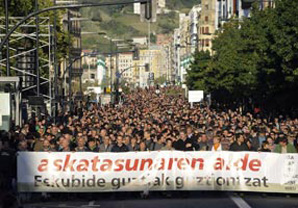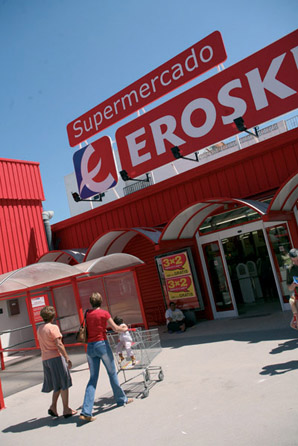 |
Peoples' movements and protests |
 |
|
MobilizationsLatin American wars of independenceNorth American war of independenceSlave uprising in HaitiIrish nationalism and Sinn FéinRussian revolutionIndia independence movementChinese revolutionAlgerian war of independencePalestinian movementVietnam warBreton movementBasque movementNorwegian opposition to EUTo National movementsTo main page |
The Basque movement
The Basque Country was one of the earliest industrialized areas in Spain. But capital came from outside and so did the workers. The first Basque political expressions at the end of the 19th century were the protests by Bilbao’s Basque natives over the depravity and social misery of their city. For a long time, Basque nationalism remained a concern for middle-class intellectuals. Some of these, however, helped to organize agricultural cooperatives, which is why the farmers from the 1930s onwards were moderately positive towards the nationalists as a group. But what made Basque nationalism a popular movement was Franco’s dictatorship. The Francoist regime was the most centralist Spain had ever seen. Everything was to be decided in Madrid and anything that could affect regional self-assertion was forbidden (eg to say hello in Basque). Basque nationalism therefore became a way of resisting the dictatorship. Nationalists founded schools as an alternative to the state, and raising money for them became a mass movement. Basques founded producer cooperatives as a democratic alternative to both the large companies in Bilbao and the regime’s hierarchies – below is a picture from Spain’s largest retail chain, the cooperative Basque Eroski. Young people organized festivals with Basque folk music and demonstrations that were beaten bloody by the police. And clergy students founded ETA and managed to blow up Franco’s Crown Prince. At the collapse of the Franco Empire, all Basques were nationalists and helped give Spain the federal character it now has. But this also isolated the militants in ETA, which nowadays mostly consists of second-generation immigrant youths for whom struggle and violence have become a way of asserting themselves.
Reading
|

